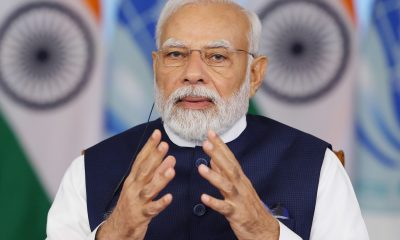News
The U.S. Capitol riot shows civil unrest is today’s major national security threat

The end of the Cold War marked the beginning of an era of major shifts in the nature of security threats. Internal conflicts and civil unrest of the type we saw in the recent raid on the United States Capitol by Donald Trump supporters have replaced external military aggression as the major source of threat to human lives and state stability.
Non-traditional threats such as transnational crime, cyber-attacks, bioterrorism, infectious diseases, pandemics and climate change are now recognized as posing serious risks to the peace, security and stability of nations.
Nonetheless, this shift isn’t reflected in the national security strategies of most countries as they continue to remain fixated on addressing traditional threats through military might.
Low priority
An analysis of the national security strategies of G20 countries, for example, shows that non-traditional security threats like pandemics, cyber-attacks and climate change are either absent from their lists of potential threats or assigned a low priority. The 2017 National Security Strategy in the U.S., for instance, lists “inter-state strategic competition” as the primary national security concern.
Likewise, the entire focus of China’s defence considerations, according to its most recent defence white paper, is its rapid economic growth, technological advancements with respect to weapons systems and the shifting international geo-political landscape.
And although Russia’s security policy includes political, economic and societal stability, in practice it is overwhelmingly focused on military means to ensure national security.
Shortcomings
This approach has serious shortcomings that are laid bare by the ongoing pandemic and other recent developments, including the violent attack on the U.S. Capitol and incidents of police brutality that resulted in widespread Black Lives Matter protests last year.
These major events are a stark reminder of the changing nature of threats. They indicate that first and foremost, many sources of human and state insecurity are internal in nature and are often linked to systemic inequities and social injustice.
Secondly, in an era of social media, social and political divisions can be exploited by foreign adversaries to spread disinformation and destabilize nations, as demonstrated by Russian interference in the U.S. political system. What’s more, in an era of increased global connectivity, many threats to security, such as infectious diseases and climate change, know no borders. That means the fate of humanity is interconnected in many ways.
All of this suggests that countries around the world need globalism more than nationalism, and investment in human development more than in arms, to achieve national security.
Redefining national security
The pandemic and other major events that have occurred in recent months also suggest it’s time to redefine the notion of security in broader terms. The concept of human security proposed by the United Nations in 1994 can serve as a useful guide in broadening the notion of security. The UN’s multidimensional and people-centred concept of security underscores the structural causes of inequity and human insecurity around the world, and emphasizes collective action to address common threats.
It also draws attention to the fact that that the risks to human well-being and security are present everywhere — in rich and poor nations — and at all times. Human security does not aim to replace the traditional concept of security, but simply widens it by including traditional as well as non-traditional threats.
Threats to security are interconnected, so security cannot be pursued effectively in silos. Health insecurity, for instance, may lead to economic insecurity — as exemplified by the ongoing pandemic — and community inequities in the form of racism may lead to domestic violent conflicts.
Integrated, holistic
National security must therefore be conceived and practised in an integrated and holistic manner by addressing all sources of threats — both internal and external — posed to human and national security.
It entails maintaining a balance between investment in military and investment in strengthening domestic law and order and bolstering cyber-security by tackling online sources of disinformation that foreign adversaries can exploit.
It also involves boosting investment in public health and education, providing universal health coverage and eradicating poverty and social exclusion. Finally, national security also requires comprehensive action against global security threats like pandemics and climate change through collective action, multilateralism and global solidarity.
The world is at a critical juncture today. It’s time to redefine security in a more profound way for a better, safer and more secure world.
Sadia Mariam Malik, Assistant Professor, Department of Economics, York University, Canada
This article is republished from The Conversation under a Creative Commons license. Read the original article.





















